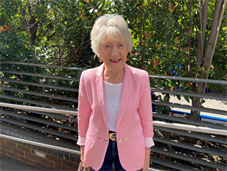New skin cancer treatment trialled at King’s
26 September 2022 - Liquid radiotherapy used as an alternative to surgical removal of cancerous lesions

King’s College Hospital has become the first centre in the UK to begin a phase IV clinical trial to further evaluate the efficacy of a new radiotherapy treatment on patients with skin cancer.
The EPIC-Skin study is looking at the use of rhenium radionuclide therapy when applied to non-melanoma skin cancer, of which there are 147,000 new cases recorded in the UK each year, and more than 7.7 million globally.
During the single-session treatment a barrier material, similar to cling film, is placed on the cancerous lesion. Liquid radiotherapy is then applied, penetrating both the material and the cancerous skin beneath.
The standard treatment for non-melanoma skin cancer is surgical removal, which can risk scarring or loss of function. Rhenium treatment uses a non-invasive paste containing ß-emitting particles directly to the lesion, which target cancer cells without the need for surgery and without damaging adjacent healthy tissue.
The targeted treatment will be used on patients with a recurrence of non-melanoma skin cancer or where conventional treatment is not suitable.
The patients at King’s are among 210 adults participating in this phase 4 international study. Their progress will be followed over the next 24 months to see how well the treatment works, and to note any associated side effects not detected in earlier trials.
One of the first patients at King’s to receive the new treatment was 77-year-old Finola Cronin from Chislehurst. Finola initially was concerned about an area of skin on her leg so she went to her GP. After being referred to King’s College Hospital, where other areas of her skin were checked, another lesion of concern on the upper middle part of her back was identified and biopsied. While the mark on Finola’s leg was benign, she was found to have non-melanoma skin cancer on her back.
Talking about her treatment, Finola said, “I was asked whether I wanted to trial this new treatment and I liked the idea of it being non-invasive so decided to give it go. I had the treatment two weeks ago – it wasn’t painful and I avoided the need for surgery.
“I’ve got an app on my phone where I can upload photos of the area so doctors can keep an eye on the healing process in between my two-week, six-month, 12-month and 24-month check-ups.”
Dr Nicola Mulholland, Consultant Nuclear Medicine Physician at King’s College Hospital and study Chief Investigator said, “With rates of non-melanoma skin cancer (NMSC) on the rise globally, it is vitally important that new treatments are developed and tested. We are very pleased to be able to offer new therapies to patients involved in studies and trials, with the hope of advancing treatment for skin cancer.”
Dr Saqib Bashir, Consultant Dermatologist and Skin Cancer Lead at King’s College Hospital says, “When it comes to cancer research, it’s important to continually innovate. This study offers an opportunity to further investigate the efficacy of non-invasive epidermal radioisotope therapy.”
In addition to efficacy, the EPIC-Skin study will also measure patient reported outcomes such as quality of life, treatment comfort and cosmetic outcomes. Patients in the study will be able to record their experiences via the app.
